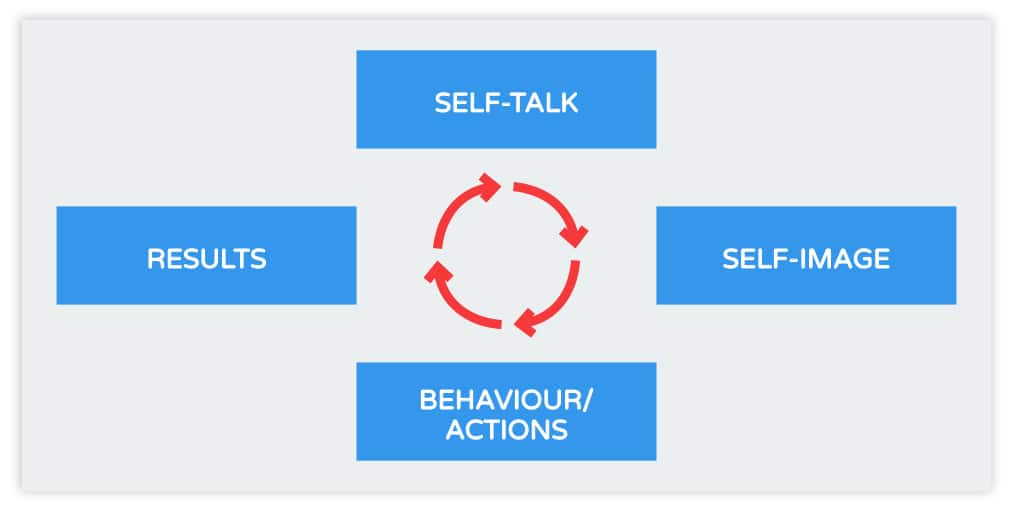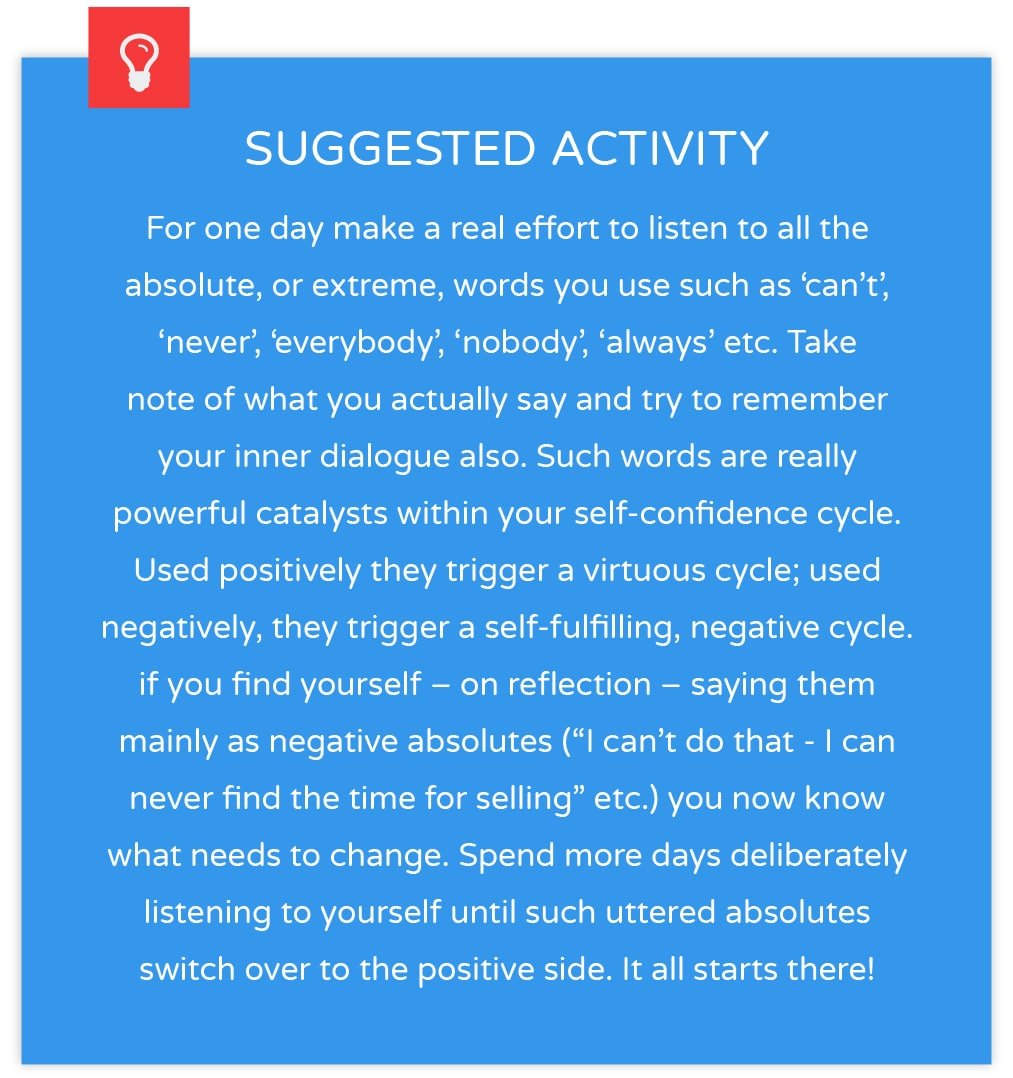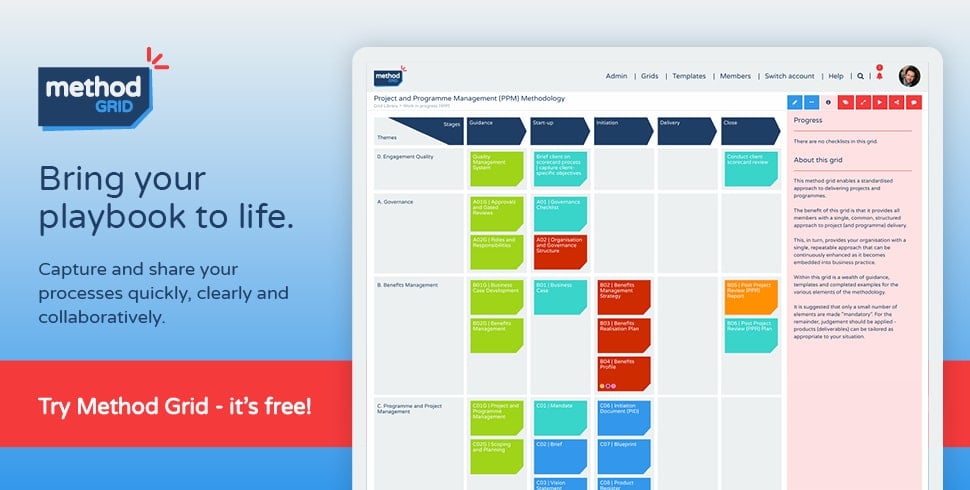Smoke screens - The self-confidence cycle - Where the successful performers start - The voice within - Eradicating rational lies - Sixty-six days - Chatting at the bar
Last week, we looked at the fundamental differences between marketing and selling. As I emphasized, this is a critical distinction to understand before we get going in this latest blog thread: looking at the question of how professional service companies can develop a truly systematic selling capability.
I can now start to describe the various elements of such a deliberate programme – as designed to tackle this key area. Over coming weeks, I will dive into the multiple constituent parts – all of which need to be carefully integrated (via a well-run project!) to achieve the aggregate benefit of a permanent change to affairs.
Before I head towards the many technical and process-oriented aspects of this (sales categorization, pipeline disciplines, sales activity targets, the process or science of selling etc) I need to next talk about the sales attitude you need to inculcate.
Climbing Mount Audacity…
From Startup to Scaleup!
We're sharing everything we know about how to build an awesome professional service firm (and enjoy the journey en route!) PLUS travel updates, reflections on our stumbles and general musings on our Method Grid journey.
Signup below to get the latest articles
direct to your inbox.
You see, it all starts here.
A winning sales attitude
The most considered process in the world will not make up for this truth. Indeed, the most complex sales methods are often authored by people seeking to erect a smoke screen around their inherent, or subconscious, unease with the actual act of selling. First and foremost, building a sales capability lives or dies on whether you can change attitudes and motivations (yours and those of all colleagues) towards selling. Put simply, changing your team’s ability to sell work rests on the foundation of a winning sales attitude.
As a leader of a professional service business this rests on the example you set.
Let me start with a question.
In relation to the self-confidence cycle (see figure below), where would you place the normal starting-point?

Figure: The self-confidence cycle
The answer is that most people effectively start with RESULTS; they examine the latest outcome (be that within their professional role, personal life, sporting endeavours etc.) and, from this often induce mediocre or negative self-explanation: “I am not cut out for sales – I don’t have the ability to be successful in this role – I will never find my perfect partner – I will never beat my running time of five-years ago” etc). This, in turn, leads to (subconsciously at least) mediocre or negative self- image, which begets the same old behaviours and, unsurprisingly, the same old results.
Often we have little or no idea of this ongoing narrative within ourselves. If there is one simple message from this blog, it is this: successful performers don’t start here, they start at the self-talk stage. They recognise that this is the only domain over which they have full control. They ignore the current situation and historical results and recognise that change has to start with the voice within.
This is far from easy. We have been so emotionally conditioned by our past experiences and relationships – especially so in childhood. There are many studies that show that the typical childhood experience is one of parental negative reinforcement hugely outweighing positive messages. By a factor of hundreds.
So, it is of little surprise that most of us are hardened cynics by the time we reach adulthood. And, this internal dialogue – whilst it is a subjective perception of how the world works – becomes our immutable reality, our version of the truth (1).
Words (spoken internally as well as out loud) have a particularly potent role here. We are often guilty of over-using extreme negative words: “The trains are always late.” No they are not; in fact in the vast majority of occasions they run to time. There are endless examples. Such words conjure up images and pictures which, in turn, influence our feelings. Imperceptibly, we put in motion a near inevitable end-state by dint of the words we use. Conversely, if you flip into extreme positive affirmation and self-talk (“It’s like me to hit my goals”) then the opposite dynamic will be enabled.
Selling is awash with rationalisations as to why you haven’t hit targets (personal or collective). Every month of the year has an accompanying narrative as to why sales are slow (December: “heading into the Christmas season”, January: “everyone slow out of the blocks back into New Year”, February: “half-term school holidays have impacted”, March: “financial year-end in the way” etc). Similarly, at a personal level, there are always a hundred and one reasons why time can’t be found for sales activity (current client work, latest internal crisis etc). These are, often, rational lies. You have become a silent victim of your own self-talk.
So, at the start of this journey you need to go right back to the most inaccessible recesses of your own psyche and seek to recognise, and correct where necessary, your own self-talk.
Owner-managers need little external motivation to sell and grow their business as the rewards are obvious; it is this inner motivation that is key. So the first step in any capability programme to improve your sales is to ensure your own self-talk is positively adjusted. Please note that even with such an initial change, it will take time to embed it as a habit. Sixty-six days to be precise according to some recent research (2). Only once your own selling self-talk is in the right place, can you with authenticity coach and encourage others to sell with a similar positive frame.
This might, at first pass, all seem a little tangential to the topic of selling. Again, I probably stood in your shoes many years ago – when I just wanted to dive into the more tangible aspects of the challenge (tools and processes etc). I can’t emphasize enough, however, how critical this aspect is to the challenge. To put it in perspective, when we eventually developed all of our methods, tools and processes (see blog) and had next to train the whole firm in the approach … talking about the right sales attitude and developing sales confidence took up 50% plus of the training time. I see this with the many professional service firms I talk to also; indeed, the more technical the nature of the business, the more that selling tends to be positioned as a negative, not-for-me discipline. Changing these mindsets – across such a team – sits at the heart of the challenge.
As a final aside, I will share another thought. I used to spend a lot of time with junior colleagues helping them through this confidence, and self-talk journey, explaining how delimiting their career options are if they definitively seek never to sell. It was common for inexperienced colleagues to metaphorically view the seller-to-prospective-client encounter as one of nervous, forelock tugging: “Do you mind if I can … possibly … find time with you to … talk about me” type conversations. I would encourage a simple metaphor flip. Selling professional services is akin to standing next to an acquaintance, peer-to-peer at a bar and, side-by-side, exploring whether there is a mutual fit between the prospect’s current need and your provider expertise. If there isn’t at that point in time … no big shakes at all … as 99 times out of a 100 you will just have had a pleasant, professional conversation and can look forward to catching up again in the future to check in on that question again.
With that relaxed, positive and winning sales attitude adopted, all the additional tools, processes and top tips I am about to impart will just flow from there.

So, what’s next?
Next week, I will continue my focus on selling and how to build a sales capability: with a look at communication effectiveness.
Hopefully, you’ll join us on this journey. It’s totally free, and you don’t have to be a Method Grid customer (though you’re more than welcome to sign up for a free trial here).
We’ll be releasing a new post each week. To get each post emailed to you as soon as it’s published, sign up for the Climbing Mount Audacity mailing list below.
Climbing Mount Audacity…
From Startup to Scaleup!
We're sharing everything we know about how to build an awesome professional service firm (and enjoy the journey en route!) PLUS travel updates, reflections on our stumbles and general musings on our Method Grid journey.
Signup below to get the latest articles
direct to your inbox.
See you next week. Have something you want to hear more about? Let me know in the comments below or via Twitter.
Footnotes:
(1) For a brilliant expose on this early period of attitude formation, I commend you towards the excellent but rather obscure book: Advice from a Failure (Coudert, 1965).
(2) Modern research (e.g. ‘How are habits formed: Modelling habit formation in the real world’, Lally/van Jaarsveld/Potts/Wardle, 2010, European Journal of Social Psychology, Volume 40, Issue 6) has shown that (whilst it depends on the speci c habit and the people being tested) on average it takes 66 days. A much-quoted, popular ‘21-day hypothesis’ most likely emanates from a book published in 1960 by a surgeon, Dr Maxwell Maltz, who noticed that amputees took, on average, 21 days to adjust to the loss of a limb. On this observation, he argued that people take 21 days to adjust to any major life changes.

 Project and Program Management
Project and Program Management  Project Governance Framework
Project Governance Framework  Benefits Management Framework
Benefits Management Framework 







